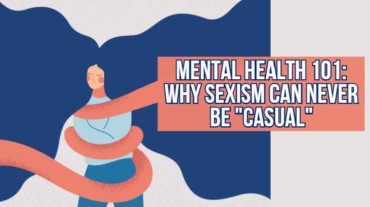
While writing this piece on casual sexism and mental health, I did what I normally do when I write: I looked into research papers, news articles, blogs and the likes. But what I found made me feel uneasy yet curious.
A simple Google search on “sexism mental health” yielded pages of articles on individuals–mainly women–experiencing sexism at their workplace, homes, social gatherings and unsurprisingly, on the streets. As many would, I began to reflect on my own experiences of casual sexism.
But first, let’s understand what casual sexism entails
Casual sexism is any behaviour or communication that involves treating an individual differently because of their gender. Sexism takes many forms such as:
Endorsing traditional gender role stereotypes: For instance, a woman can be told to “look pretty” and “act like a lady” and is advised not to have “too many strong opinions”.

Actions that are demeaning or belittling: This includes language patronising women such as telling a man that he “runs like a girl”; or demeaning men in saying that they have “their brains lying between their legs”.
Sexual objectification: This is most commonly experienced as street harassment, receiving comments about one’s appearance and being touched inappropriately, including behaviours like groping.
What the link between sexism and mental health?
A study at University College London in 2019 found that women over the age of 16 years who experienced sexism were three times more likely to be depressed and developed poorer mental health over the following years.
The researchers reported a “clear and damaging link” between sexism and mental health. Here’s how casual sexism can adversely impact someone’s mental health:
Inculcating fear: Receiving sexist remarks, especially on the streets, can lead one to fear for their safety–that they may be verbally or physically attacked. A person experiencing this might engage in avoidant behaviours such as avoiding certain places at certain times or ceasing to go out altogether.
Existing in a constant state of hypervigilance can lead to heightened levels of psychological distress and the development of anxiety.
Feeling inferior: Women may be condescended to in the workplace and are not seen as equals to their male colleagues. Research suggests that women working in male-dominated offices may experience loneliness or rejection– often leading to depression.
Select Topics of your interest and let us customize your feed.
PERSONALISE NOWLack of confidence: Although casual sexism may have been intended to be, as the name implies, a casual remark, it can knock down one’s self-confidence and lead the individual to question their self-worth.
For instance, a comment that targets the entire gender may be seemingly innocuous (for instance: “women belong at home with their children”) but can aggravate the woman’s negative assumptions and insecurities about herself, leading her to feel inept.
Self-blame: As casual sexism becomes a common occurrence and we become passive bystanders, women have learned to internalise the blame. When we receive a sexist remark, we to start to doubt ourselves, thinking that we are at fault. We have all heard the blame attributed to the woman for wearing a revealing outfit and asking for the attention. This leads to self-blame rather than confronting the perpetrator of abuse or sexism.

Disempowerment: All of the above can result in learned helplessness in women. The message learned is that we cannot implement change, that casual sexism has sedimented a place in society and that the target needs to “chill out” and “not take it seriously”. These responses perpetuate casual sexism and can lead to the affected individuals feeling disempowered.
While the media plays a role in proliferating gender roles, these can be entrenched within us from a much earlier age, often budding at home.
Understanding how deeply casual sexism can impact our mental health, we not only have to speak up for its moral negligence but have to make active efforts to combat these stereotypes to eliminate sexism–which is not so casual after all.